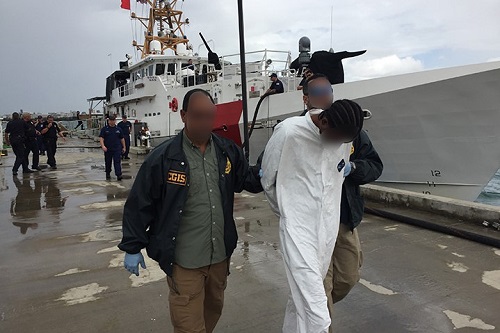Ricardo Castrodad photo
By
Ricardo Swire
The Caribbean is divided into geographical sectors with islands managed by American, British, French and Dutch political powers. Members and surrounding coasts are positioned in the Caribbean Sea southeast of the Gulf of Mexico and North America, east of Central America north of South America. In the recent past the Dutch Caribbean sector of the Lesser Antilles reported increased drugs, guns, human trafficking and organized crime challenges. Such internal security complications can filter through the neighbourhood with disharmonious consequences.
CARICOM national intelligence officials constantly analyse regional and international organized crime trends. Revised data indicated that even with the Kingdom’s support for its Caribbean judiciary, Dutch Caribbean Coast Guard (DCCG) and RST or Recherche Samenwerkingsteam, member islands’ security loopholes remain unresolved. Additionally, international terrorist activity festers in the environment. Lingering internal security deficiencies have contributed to DCCG corruption. DCCG is maritime partnership between the Netherlands, Aruba, St Maarten and Curacao.
Three years ago “Operation Baywatch” exposed the depth of criminal subversion within Dutch Caribbean islands. Fourteen enforcement raids unmasked three DCCG members and one former colleague, who belonged to a drug-trafficking and money laundering network based on Curacao. The military quartet also leaked confidential information to drug traffickers for a price. Operation Baywatch officials seized a large quantity of cash, one firearm, computers and a trafficable amount of ecstasy pills.
In another Dutch Caribbean internal security anomaly the Secret Service of Curacao (VDC) was subtly taken over by a gambling mafia. Text messages intercepted on January 18th 2010 communicated how Chief of the Department of Internal & External Security of the Secret Service of Curacao breached protocol by accepting a high-value loan from a gambling tycoon to pay a debt. A VDC whistleblower confirmed the gambling magnate’s close links to dubious figures on St Maarten, such as the resident Italian mafia character. The gambling industry tycoon’s connection to Hezbollah members also highlighted.
Curacao’s free-trade zone (FTZ), state-of-the-art shipping and port facilities make that island a key hub in legitimate global trade. The Dutch Caribbean territory is a major offshore banking and financial services centre. Such industries represent an intrinsic part of Dutch tropical satellites’ political-economy, often associated with money laundering and tax evasion. The scenic Caribbean island’s reputation plus ratings as a tourist paradise, for European and North American vacationers, allows Curacao’s dark side to be overlooked.
The Dutch Ministry of Security & Justice introduced a “Master Plan Strengthening Law Enforcement in the Caribbean part of the Kingdom” to counteract corruption and crime. From 2015 to 2017 more than €20 million officially re-directed from the Dutch police budget, to facilitate deployment of fifty additional law enforcers. Mobile patrols on St Maarten, where mafia elements control the gambling industry, increased. Recent history denoted when terrorism, drugs trafficking and organised crime unite the surrounding community becomes violent and negatively polarized.
Internal security records identified one complex Hezbollah drug trafficking network that operated from Curacao. Four Lebanese plus co-conspirators from Cuba, Venezuela, Colombia and Curacao used cargo ships alternating with speed boats to transport cocaine from Colombia and Venezuela. The tropical Dutch island was designated launch point for two shipments with a collective weight of two thousand kilos, or four thousand four hundred pounds, destined for Africa and Europe. The traffickers’ elaborate money laundering scheme encompassed real estate in Curacao, Colombia, Venezuela, the Dominican Republic and Lebanon.
Legitimately registered Curacao businesses operated as front companies. Some drug cash was channelled, via informal Middle Eastern banks, to Hezbollah accounts. The remainder sent to Hezbollah satellite groups in the Bekaa Valley, Lebanon. While Hezbollah routinely receives financial and material support from Iran, the group boast an impressive independent fundraising capability. Donations, provided by global supporters and sympathizers, include the sizeable Arab Diaspora in Latin America and the Caribbean. Money received from illicit activities helps sustain Hezbollah’s social service, political, and military wings.
Lebanon’s Shi’a Islamist Militant Group is heavily implicated in the Middle East drugs trade, with powerful tentacles inside the borders of archenemy Israel. Jerusalem is one of the region’s largest markets for recreational drugs. An international report noted the episode of Hezbollah’s recruitment of an Israeli Defense Force (IDF) Lieutenant-Colonel who directed his own drugs business in Israel. Hezbollah operatives supplied the senior IDF officer with hashish and heroin, in exchange for national intelligence information.
In 2017 Dutch officials upgraded Caribbean satellite islands’ maritime enforcement capabilities, through a corporate deal with American shipbuilder “Metal Shark” headquartered in Louisiana. The government agreement secured an order for twelve new patrol boats. In early May 2018 four Metal Shark custom-made 38 Defiant monohull patrol vessels were commissioned by DCCG officers in Curacao waters. The novel Interceptors’ forty knots speed increases the fleet’s range and reduces response times. Specially engineered composite armor panels and adjoining “Shockwave Corbin shock-mitigating seating” provide a six member crew with protection from hostile gunfire.
Metal Shark’s remaining deliveries replace the DCCG’s open-cockpit “RIBs” fleet on patrol routes between Aruba, Bonaire, Curacao, St. Eustatius, St. Maarten and Saba. Dutch armed forces maintain permanent presence on Curacao. United States (US) Southern Command (SOUTHCOM) forces utilize Curacao and fellow Dutch Caribbean island Aruba as Forward Operating Locations (FOL) that support regional undertakings. American surveillance aircraft fly from Curacao’s Hato International Airport on counter-narcotics detection and monitoring missions.
Ricardo Swire
Ricardo Swire is the Principal Consultant at R-L-H Security Consultants & Business Support Services and writes on a number of important issues.



No Comments Yet!
You can be first to comment this post!